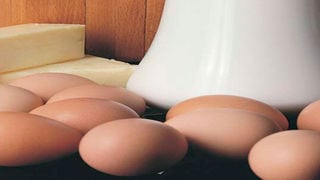
Eggs and milk
| File | Nation Media GroupBusiness
Premium
Trade ministry lists products that won’t be imported duty-free from UK
Eggs, milk, and cereals are among agricultural products the United Kingdom will not ship into the country duty free in order to protect local farmers and agri-processors from unfair competition from cheap food imports.
Also on the list of duty free restrictions are textile and apparels from London, as the two countries head towards the end of ratifying the Economic Partnership Agreement (EPA) signed last December.
Trade Cabinet Secretary Betty Maina says the ministry has generated a list of sensitive products that will not be imported into Kenya duty-free and on which quotas will be placed, as she added that the EPA contains specific provisions for protecting the Kenya and East African Community (EAC) market from unfair competition from UK producers.
Agricultural products
The list of sensitive products, Ms Maina said, are mostly agricultural products – and will retain same sensitive rate as was with the EAC-EU trade deal that expired in December last year.
In the EPA, Kenya will start phasing out duty and quota barriers on finished products from the UK after 12 years of the EPA ratification, while tariffs for intermediate goods will start being reduced from the seventh year of ratification.
“The UK access to the Kenyan and EAC market is subject to a progressive and gradual reduction of duty over a period of 25 years. It is a process where the full elimination of any of the applicable duties and the tariffs that we have right now, will only be attained after 25 years,” said Ms Maina.
The finished products UK exports to Kenya include vehicles, electronics, machines and alcohol among others, which attract 25 per cent tariffs and constitute 2.6 per cent of trade between the two countries. The UK has also been allowed to export arms to Kenya on those terms.
Phasing out
Some of the intermediate goods that Kenya imports from UK and on which duty and quota barriers will start being phased out in 2028 include paper and paper board and paper and board newspapers among others. They constitute 10 per cent of the Kenya-UK trade.
Kenya wants to liberalise a total of 82.6 per cent of its trade with the UK by 2046. It has, however, protected 17.4 per cent of the section of its market it considers sensitive and in which the agricultural products fall.
“While exports from Kenya and the EAC partner states gain immediate access to the UK market, free of duties and free of quota restrictions, UK access to the EAC market will be subject to a progressive and gradual reduction of duties and quota restrictions, implemented over a period of 25 years,” the CS said.
Unfriendly trade environment
But the ministry notes that Kenya may fail to benefit from the ongoing EPA with the UK if it does not resolve the unfriendly trade environment that has made locally produced goods more expensive than to those from neighbouring EAC states, as well as enhancing export of value added commodities.
Ms Maina admitted that some of the products from Kenya, especially agricultural, have been expensive due to high costs of production, or they are being exported in their raw or immature form. She said the government is now working on a framework to enhance internal trade and production so that Kenya maximises gains over the seven and 12 years that UK will be paying tariffs.
“In our view, because trade is a give-and-take situation, we believe that we have sufficient time to make the necessary adjustments for us to be competitive in that field,” she said.
Progressively, Kenya targets to capture five per cent of the UK market.
The agreement is supposed to take effect by March 31 after ratification by parliaments in both countries, with the UK parliament having already concluded the process on February 10.
The Kenyan Parliament, however, halted a session to debate the agreement last Thursday after realising that some documents that were initially not included during its tabling had been introduced.
The lawmakers deferred debate on the report of the Trade, Industry and Cooperatives Committee after some sections containing details of the pact were sneaked in without the authorisation of the Speaker.
National Assembly Speaker Justin Muturi said it is a serious offence and against the Standing Orders for additional documents to be introduced on the floor of the House without his ratification.
“If the documents as confirmed by the deputy clerk were not received by this House, then it is a serious issue. Do not sneak in documents over lunch hour because that is not how business is conducted here,” Mr Muturi said.
“This is Parliament of the Republic of Kenya and must have a say on the ratification of the agreement. Those telling us they are in a hurry should have started yesterday,” Mr Muturi added.






